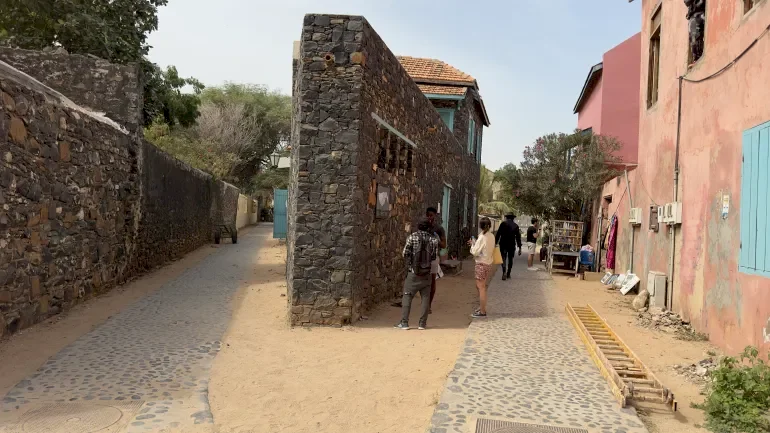
The "House of Slaves" in Senegal: A Living Memory of the Atlantic Slave Trade
SadaNews - The "House of Slaves" on Gorée Island in Senegal stands as a living witness to one of the darkest chapters in human history, serving as a center for the gathering of Africans and their forced transportation across the Atlantic into slavery in the New World.
Since the 15th century until the 19th, the island located off the capital Dakar played a crucial role in the Atlantic slave trade, where millions of Africans were taken to the Americas. Today, Gorée Island is regarded as a global symbol of this human tragedy.
Gorée... that brown palm extended by nature amidst the green wave shores, before being watered by waves of tears, rising above the dark backs of passersby—elders, boys, and women—under the whips of the white slave traders who established the pillars of Western economies, the wealth of peoples, and the institutions based on a foundation of hunger and tears from African slaves, many of whom crossed the waves leading to Gorée, launched by ships sailing through the unknown, before being cast into the final resting place of pain, the farthest point from their birthplace, as documented in a report by the correspondent of Al Jazeera, Amin Habla.
UNESCO classified this island as a World Heritage site since 1978, and for decades it has become an essential part of Senegal's tourism resources, attracting hundreds of tourists daily. An ongoing economic activity thrives there, benefiting the country's economy and the village residents (the island) whose number does not exceed 1,200. They rely on the wealth generated by the memories of tears and the remnants of the slave trade, as well as on the thirst of tourists for painful stories and information about the millions who crossed the waves under the mercy of the whips of the white man.
A European Battlefield
The Portuguese shook off their garments on the shores of Gorée in 1444, marking the first European grasp of slavery in this tranquil island. Not six years after their descent into this maritime patch, they established a trading center and a church whose mass echoed in 1450. Then came the era of the Portuguese, and in 1617, the Dutch seized the island, before it sequentially passed under French, British, and then back to French control for four centuries, ending in complete French dominance since 1817.
Given Gorée's role in the slave trade as the direct harbor that is only 8,000 nautical miles from the United States, it became a battleground of contention among colonial powers, which exchanged control of it 17 times.
The French were the luckiest, as their control extended over it for more than two centuries. The period of Western control over the island was filled with painful journeys that transported kings, commoners, scholars, children, and warriors in chains, like cattle being traded.
The painful irony lies in the fact that the bloody centuries of Gorée coincided with the height of the European Enlightenment and the West's relentless progress towards democracy and human rights, whose meaning and freedom diminish unless they pertain to Europeans—settlers, conquerors, or traders traveling through the vastness.
Senegalese human rights activist Alioune Toun believes—in a conversation with Al Jazeera—that Gorée represents the most horrifying story of civilizational upheaval in history, where European vessels were laden with the horrors of terrorism, transporting them to farms, fields, mines, and western factories, thus establishing the industrial revolution on the backs of Africans.
Toun views this period as one where we hit rock bottom in our treatment of African humans and their dignity, when there were those who did not see them as human beings. This is the nature of colonialism, as colonialism, according to him, is always about domination, changing identities, names, languages, cultures, and thus, like slavery, it is considered a crime against humanity.
Source: Al Jazeera + Anadolu

How Cyber Operations Have Played a Role in the Ongoing War Against Iran?

After a Century of Confusion.. New Study Redefines "Source of Intelligence"

An Anticipated Revolution in Fracture Treatment Using "Gel Material"

Hope for Peanut Allergy Treatment... From the Microbiome

Amazon Web Services Faces Power and Connectivity Issues in the UAE and Bahrain

Dual Sleep Disorders Increase Heart Burden

Fasting and Exercise: A Delicate Balance Between Enthusiasm and Health

